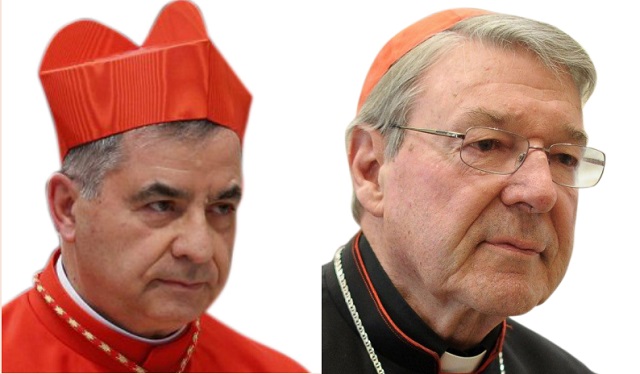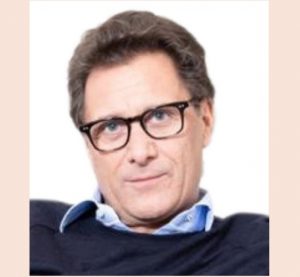
Who in the Vatican knew?
Prosecutors have acknowledged that Pope Francis was aware of the deal, and even attended a December 2018 meeting with Torzi. One witness has said Francis agreed to pay Torzi a “just” compensation to turn the building over.
Other high-ranking officials, including the secretary of state Cardinal Pietro Parolin and his deputy, Archbishop Edgar Pena Parra, were also aware and approved the deal with Torzi. Documents show Pena Parra had authorised one of his deputies to sign the contract with Torzi giving him full voting rights.
None of them was indicted. Prosecutors say they didn’t understand Torzi’s contract change, were kept in the dark about Torzi and Mincione’s dealings, their previous business relationship, as well as alleged commissions others involved in the deal had been earning on the side.
Who is Cardinal Becciu and how is he tied to this trial?
Cardinal Angelo Becciu is the lone cardinal indicted and will be the first cardinal prosecuted by the tribunal after Pope Francis changed Vatican law to allow laymen to judge cardinals. Becciu has denied any wrongdoing.
Becciu was once one of the most powerful prelates in the Vatican and would have been a contender to be a future pope before Francis fired him last year from his job leading the Holy See’s saint-making office.
Francis asked him to resign in September, and stripped him of his rights and privileges as a cardinal, citing a 100,000 euro donation that Becciu made using Vatican money to a diocesan charity run by his brother. At the time of the donation, Becciu was the No. 3 in the Secretariat of State and had decision-making authority over the office’s vast asset portfolio.
Becciu is tied to another defendant in the case, Cecilia Marogna. She is accused of allegedly embezzling Holy See funds that Becciu authorised for her intelligence work, purportedly to free Catholic priests and nuns held hostage in hostile parts of the world. Prosecutors say she spent the money on luxury goods instead.
What does a Vatican criminal trial look like?
The criminal code of the Vatican City State is based on the 1889 Italian legal code as well as elements of the canon law of the universal Catholic Church. In recent years, the pope has updated the code with a host of financial crimes specifically to address the types of misconduct alleged in Saturday’s indictment.
The Vatican tribunal has been under pressure to prosecute financial crimes as part of the Holy See’s participation in the Council of Europe’s Moneyval process, which is aimed at helping countries fight money laundering and the financing of terrorism.
The Vatican entered into the Moneyval evaluation program over a decade ago in a bid to shed its image as a shady, offshore tax haven.
The Vatican has outfitted a new courtroom for the upcoming trial in part of the Vatican Museums, given its usual criminal tribunal will be too small for the defendants and their lawyers. If convicted, the defendants could face jail time, fines or both.

Here are the major figures in the scandal:
Raffaele Mincione – An Italian businessman who served as financial advisor for the Vatican Secretariat of State. He helped the Secretariat invest millions of dollars in Peter’s Pence funds, which are donated by Catholics around the world. Mincione encouraged the Secretariat to buy a stake in a London building he owned, through funds they had invested in another one of his companies, and then gradually sold them the property, marking up the price each time and charging them management fees throughout the process, leaving him with millions of euros in personal profit. Mincione has also been involved with other high risk business ventures, and was involved with a company fined in 2016 for misleading investors.
BSI – A controversial Swiss bank known for violating safeguards against money laundering and fraud. Vatican sources have confirmed that a significant portion of the Secretariat of State’s $200 million loan to invest in the 60 Sloane Ave property came from BSI. The bank was dissolved by Swiss authorities for failure to report suspected money laundering and adhere to other anti-fraud regulations.
Cardinal Angelo Becciu – Formerly the number two official at the Vatican Secretariat of State. In 2015, he reportedly was behind an attempt to disguise the $200 million loans on Vatican balance sheets by cancelling them out against the value of the London property purchased with the money, a maneuver that is prohibited in general accounting practices and forbidden by Vatican financial policies approved by Pope Francis in 2014. Becciu has denied that there was any impropriety in his proceedings.
Cardinal George Pell – Former head of the Prefecture for the Economy, charged with overseeing the Vatican’s financial accountability. In this role, Pell reportedly questioned the Vatican Secretariat of State’s purchase of a luxury development in London through credit extended by the disreputable BSI Swiss bank, as well as the attempt to disguise the loans, but he was reportedly met with resistance from Cardinal Becciu, who said he was interfering in internal matters of the Secretariat of State.
Luciano Capaldo – An architect charged with leading the development project at 60 Sloane Ave and one of the registered directors of London 60 SA Ltd. Capaldo has close business links with companies and individuals that are being investigated for money laundering and market manipulation or are being sued for fraud.
René Brüelhart – Former president of the Vatican’s Financial Information Authority (AIF), tasked with monitoring for suspicious financial transactions and ensuring that Vatican banking policies meet international standards. Earlier this year, the AIF released a report saying it continued to catch cases of fraud involving the Vatican’s financial institutions.
Marc Odendall – Board member for the Vatican’s Financial Information Authority (AIF), tasked with monitoring for suspicious financial transactions and ensuring that Vatican banking policies meet international standards. Odendall resigned shortly after the resignation of AIF president Rene Brüelhart. He said the AIF had become “an empty shell” after Vatican police raided the AIF in October 2019.
****
 The Independent Uganda: You get the Truth we Pay the Price
The Independent Uganda: You get the Truth we Pay the Price



